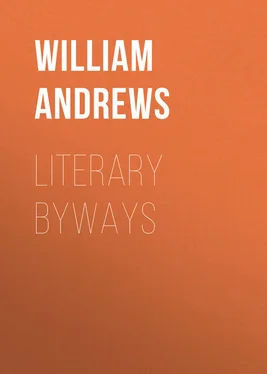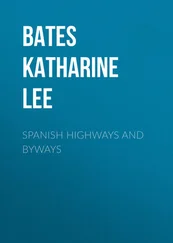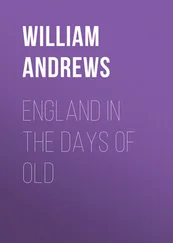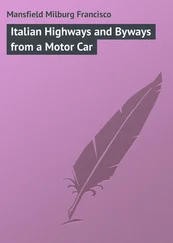William Andrews - Literary Byways
Здесь есть возможность читать онлайн «William Andrews - Literary Byways» — ознакомительный отрывок электронной книги совершенно бесплатно, а после прочтения отрывка купить полную версию. В некоторых случаях можно слушать аудио, скачать через торрент в формате fb2 и присутствует краткое содержание. Жанр: foreign_antique, foreign_prose, на английском языке. Описание произведения, (предисловие) а так же отзывы посетителей доступны на портале библиотеки ЛибКат.
- Название:Literary Byways
- Автор:
- Жанр:
- Год:неизвестен
- ISBN:нет данных
- Рейтинг книги:3 / 5. Голосов: 1
-
Избранное:Добавить в избранное
- Отзывы:
-
Ваша оценка:
- 60
- 1
- 2
- 3
- 4
- 5
Literary Byways: краткое содержание, описание и аннотация
Предлагаем к чтению аннотацию, описание, краткое содержание или предисловие (зависит от того, что написал сам автор книги «Literary Byways»). Если вы не нашли необходимую информацию о книге — напишите в комментариях, мы постараемся отыскать её.
Literary Byways — читать онлайн ознакомительный отрывок
Ниже представлен текст книги, разбитый по страницам. Система сохранения места последней прочитанной страницы, позволяет с удобством читать онлайн бесплатно книгу «Literary Byways», без необходимости каждый раз заново искать на чём Вы остановились. Поставьте закладку, и сможете в любой момент перейти на страницу, на которой закончили чтение.
Интервал:
Закладка:
Lord Byron’s dealings with Mr. Murray were in every respect satisfactory, but this did not prevent the pleasure-loving lord from having a little joke at the expense of his publisher. He delighted Mr. Murray with a gift of a Bible, but the recipient’s pleasure was fleeting, for on examining the book it was discovered that it contained a marginal correction. “Now Barabbas was a robber,” was altered to “Now Barabbas was a publisher.” This was a cruel stab, seeing that Byron had received for his poetry £19,340, and might have increased this sum if he had been more anxious about remuneration.
In Mrs. Oliphant’s book on “William Blackwood and His Sons,” a letter is quoted from Mr. Murray relating to the poet. “Lord Byron is a curious man,” says Murray, “he gave me, as I told you, the copyright of his two poems, to be printed only in his works. I did not receive the last until Tuesday night. I was so delighted with it that even as I read it I sent him a draught for a thousand guineas. The two poems are altogether no more than twelve hundred and fifteen hundred lines, and will altogether sell for five and sixpence. But he returned the draught, saying that it was very liberal – much more than they were worth; that I was perfectly welcome to both poems to print in his (collected) works without cost or expectation, but that he did not think them equal to what they ought to be, and that he would not admit of their separate publication. I went yesterday, and he was rallying me upon my folly in offering so much that he dared to say I thought now I had a most lucky escape. ‘To prove how much I think so, my lord,’ said I ‘do me the favour to accept this pocket book’ – In which I had brought with me my draught, changed into two bank notes of £1,000 and £50; but he would not take it. But I am not in despair that he will yet allow their separate publication, which I must continue to urge for mine own honour.”
Mr. Murray treated Crabbe in a most liberal manner. He paid for the “Tales of the Hall,” and the copyright of his other poems, £3,000. It was given to the poet in bills, and we read that “Moore and Rogers earnestly advised him to deposit them, without delay, in some safe hands – but no; he must take them with him to Trowbridge, and show them to his son John. They would hardly believe his good luck at home, if they did not see the bills.” On his way to Trowbridge, a friend at Salisbury, at whose house he rested (Mr. Everett, the banker), seeing that he carried his bills loosely in his waistcoat pocket, requested to be allowed to take charge of them; but Crabbe thankfully declined, saying that “There was no fear of his losing them, and he must show them to his son John.”
Without seeing a line of Thomas Moore’s “Lalla Rookh,” Messrs. Longman undertook to pay £3,000 for it. The terms drawn up were simple, and read as follows: “That upon your giving into our hands a poem of yours, the length of ‘Rokeby,’ you shall receive from us the sum of £3,000. We also agree to the stipulation, that the few songs which you may introduce into the work shall be considered as reserved for your own selling.”
His poem, of some 6,000 lines, was written in a lonely cottage in Derbyshire. Moore never tired of telling his friends that the stormy winter weather in the country helped him to imagine, by contrast, the bright and everlasting summers and glowing scenery of the East.
The work was a great success. The first edition was sold in almost fourteen days; within six months six editions had been called for. It is said that some parts of the poem were translated into Persian, a circumstance which caused Mr. Luttrell to write to the author in the following strain: —
“I’m told dear Moore, your lays are sung (Can it be true, you lucky man?) By moonlight, in the Persian tongue, Along the streets of Ispahan.”
Moore received considerable amounts for his “Irish Melodies.” The mention of these call to mind a letter he penned to Mr. Power, his publisher, on November 12, 1812: —
“My dear Sir, – I have just got your letter, and have only time to say, that if you can let me have three or four pounds by return of post, you will oblige me. I would not have made this importunate demand on you, but I have foolishly let myself run dry without trying my other resources, and I have been the week past literally without one sixpence. Ever, with most sincere good will. – T.M.”
Mr. Power promptly posted ten pounds to the poet. Said Moore, in the course of his reply, “The truth is, we have been kept on a visit at a house where we have been much longer than I wished or intended, and simply from not having a shilling in my pocket to give to the servants on going away. So I know you will forgive my teasing you… You may laugh at my ridiculous distress in being kept to turtle eating and claret-drinking longer than I wish, and merely because I have not a shilling in my pocket, – but, however paradoxical it sounds, it is true.”
We read in Moore’s journals, ten years later: “17th August, 1822. – Received to-day a letter from Brougham, enclosing one from Barnes (the editor of The Times ), proposing that, as he is ill, I shall take his place for some time in writing the leading articles of that paper, the pay to be £100 a month. This is flattering. To be thought capable of wielding so powerful a political machine as The Times
Конец ознакомительного фрагмента.
Текст предоставлен ООО «ЛитРес».
Прочитайте эту книгу целиком, купив полную легальную версию на ЛитРес.
Безопасно оплатить книгу можно банковской картой Visa, MasterCard, Maestro, со счета мобильного телефона, с платежного терминала, в салоне МТС или Связной, через PayPal, WebMoney, Яндекс.Деньги, QIWI Кошелек, бонусными картами или другим удобным Вам способом.
1
He was thirty years of age.
Интервал:
Закладка:
Похожие книги на «Literary Byways»
Представляем Вашему вниманию похожие книги на «Literary Byways» списком для выбора. Мы отобрали схожую по названию и смыслу литературу в надежде предоставить читателям больше вариантов отыскать новые, интересные, ещё непрочитанные произведения.
Обсуждение, отзывы о книге «Literary Byways» и просто собственные мнения читателей. Оставьте ваши комментарии, напишите, что Вы думаете о произведении, его смысле или главных героях. Укажите что конкретно понравилось, а что нет, и почему Вы так считаете.












